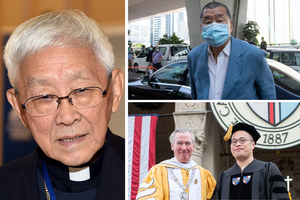Vatican Takes ‘Good Faith’ Stance With China
EDITORIAL: On the surface, it’s difficult to find many observers who support the Holy See’s assumption of the Chinese government’s good faith.

The controversial provisional agreement between the Vatican and the People’s Republic of China on the appointment of bishops that was first signed in September 2018 is up for renewal again this fall, and questions abound about the wisdom of Rome’s willingness to proceed.
Cardinal Pietro Parolin, the Vatican’s secretary of state and the point man on dialogue with China, defended the accord with China’s atheistic and authoritarian communist regime earlier this month. In an interview with an Italian news channel, the cardinal acknowledged concerns have been raised about the merits of the deal. But he insisted that it was necessary to recognize “good faith” on China’s part and to proceed with another two-year renewal of the provisional agreement to allow the “seeds” that have been planted as a result to sprout.
Outside of the Vatican’s walls, however, it’s hard to find many observers who support this assumption of the Chinese government’s good faith.
While it’s unknown exactly what the agreement stipulates, since its text has never been publicly disclosed, it’s widely understood that it assigns the appointment of new bishops to the primary authority of the Chinese regime, with Pope Francis retaining only the right to veto any episcopal candidates he judges to be unsuitable.
The deal’s central rationale, publicly at least, was that it would help heal the breach between China’s so-called “underground” Catholic Church, whose bishops pledge their communion with Rome, and the state-sanctioned Chinese Patriotic Catholic Association. The CPCA, which the Vatican has never officially recognized, was established in the early 1950s in the heyday of Mao Zedong’s totalitarian dictatorship and has been required ever since to take its direction from Beijing, not from Rome.
That continues to be the case. In fact, since the Vatican-China deal was initially signed in 2018, the official “Sinicization” of the CPCA has notably increased.
Further, Beijing has refused to offer even the slightest of olive branches to the underground Church.
Some of its bishops continue to be jailed as a consequence of their refusal to acknowledge the supremacy of the Chinese government’s religious authorities; and in July, state authorities demolished one of its churches because its pastor refused to join the CPCA.
Alongside these problems, Catholic critics cite what has happened during the term of the deal to Hong Kong and to China’s predominantly Muslim Uyghur minority.
In Hong Kong, the communist government has ratcheted up its attacks on the democratic freedoms that the former British colony retained after its control was shifted from the United Kingdom to China in 1997.
Many of the leaders of the pro-democracy movement that has resisted these intensified anti-democratic attacks are Catholic, and a number of them, including media magnate Jimmy Lai, have been imprisoned for standing up for their political freedoms.
During this same period, accounts have filtered out about the government’s appalling treatment of the Uyghur Muslim minority in the impoverished Xinjiang region of western China.
As documented by a recent U.N. report, the Uyghurs have been subjected to a comprehensive program of persecution that includes political indoctrination, forced labor, coercive birth prevention policies and the forcible detention of more than 1 million Uyghurs into government-operated camps.
The most prominent Chinese-Catholic critic of these human-rights transgressions in Hong Kong and Xinjiang has been Cardinal Joseph Zen Ze-kiun, the bishop emeritus of Hong Kong. Cardinal Zen has also been the most outspoken opponent of the Vatican rapprochement with China, arguing that it has been an abysmal failure in terms of advancing the interests of the Chinese faithful.
In retaliation, the Chinese government arrested the 90-year-old cardinal in May on charges related to his participation in a relief fund that raised money to pay for the legal fees of pro-democracy protesters. His trial was scheduled to begin on Sept. 19.
Pope Francis, Cardinal Parolin and the other senior Church officials who support the deal on the appointments of bishops are well aware of all of this problematic backdrop and are not dismissive of the human-rights issues in play.
But they argue that, as with the Ostpolitik policy that the Vatican employed during the Cold War with respect to the Church’s relations with the Soviet Union and its former satellite states in Eastern Europe, an accommodation with China’s communist leadership nevertheless serves the local Catholic flock by facilitating their worship, compromised though it might be by the government’s ongoing suppression of their religious liberty.
And as Cardinal Parolin put it, it is hoped that this accommodation will be the seed for more tangible fruit down the road.
Maybe someday it will.
But given what has happened over the last four years, it’s highly understandable that many informed Catholics continue to question whether there’s any corresponding “good faith” on the Chinese side when it comes to its deal with the Vatican.
















